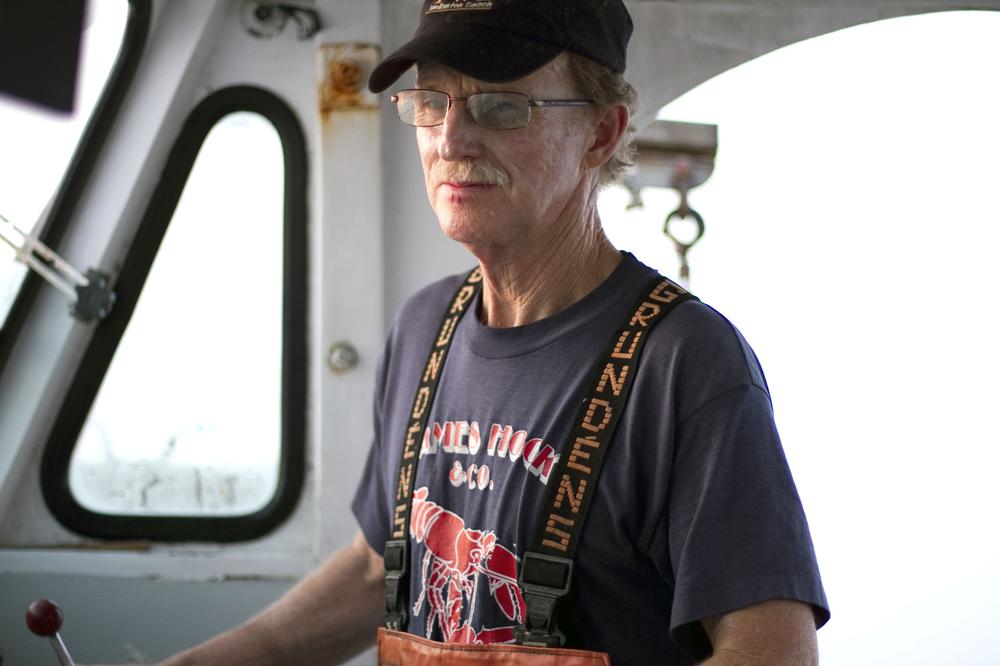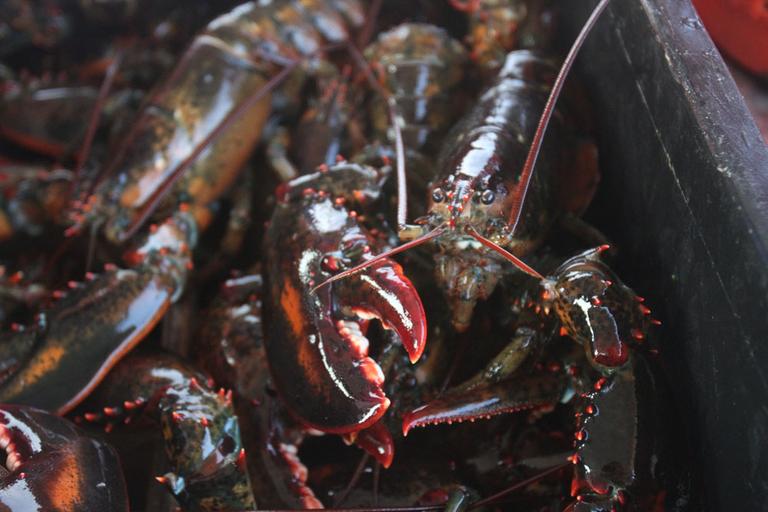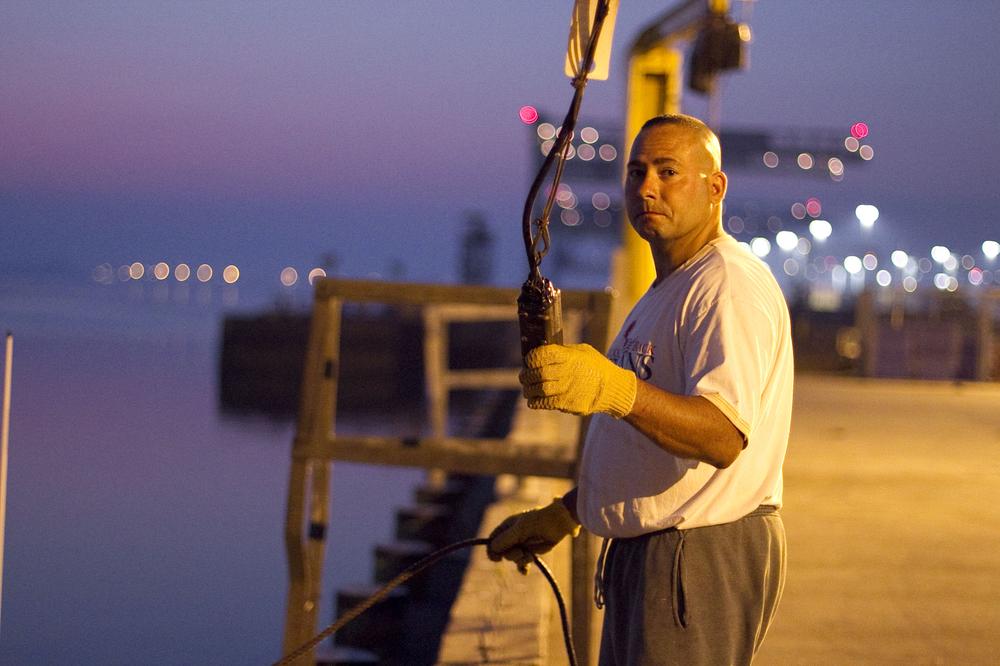Advertisement
Looking Out: Harbor Boats Drag Up Live Lobsters, Commercial Fishing History Lives On
Resume[soundslide]http://www.wbur.org/files/soundslides/2010/wbur_0708_commercial-fishing[/soundslide]
New Bedford and Gloucester may be Massachusetts’ biggest fishing ports. But in Boston Harbor, amid the cruise ships and cargo vessels and whale-watching boats that motor in and out, a handful of fishing vessels still make their livelihoods from the bounty of the port's waters. This is the third report of a summer-long series, “Looking Out: A New View Of Boston Harbor.”
No one would blame Skip Ryan if he didn’t do this anymore.
It’s four o’clock in the morning, and he’s dragging a plastic trunk of fish carcasses across the dock toward his boat. They stink.
Skip’s 68 years old. He’s got creases in his neck and his Dickies canvas work pants barely hang on his lean frame. Those filleted haddock and pollack remains? They’re bait. Skip has made a living from catching Boston Harbor lobsters since 1964.
He started even before that.

"When I was a little kid I found a couple of traps washed up on the beach and I was mesmerized by it, you know. With the nets and all that," Skip said. "I took home like four of five old ones, put them in my bedroom and rebuilt them and everything, and then finally went and got a license and put them in the water. So basically that’s how I started. Sometimes I’m not sure if I’ve done the right thing or not."
The first stop for his 40-foot boat is a channel right off the waterfront. Cruise ships dock on one side. On the other, long-haul cargo ships unload their containers. In that channel, where Florida retirees disembark across from toys from China, Skip starts pulling up his first line of lobster traps for the day.
Each trawl is basically a rope strung with 25 lobster traps — wire cages, each the size of a big trunk. As Skip winches up the lobster traps from the channel floor, Paul Cabral, Skip's sternman, pulls out any legally-sized lobsters, and throws back the rest along with any crabs and fish.
Then he puts new bait — the fish carcasses — back in. Paul is a stocky crew-cut guy from Quincy.
"I did it 20 years ago as a kid," Cabral says of his work on the boat. "I just needed some extra work."
Cabral has been working for Skip for the last month. They’ve been heading out extra early this week to beat the heat. It’s now 5 a.m., and Boston office towers are punching through the haze at dawn. Cabral has worked in those buildings, too. He's an elevator mechanic.
"But I got laid off," Cabral explained. "So I’m waiting for Barack to do something about the economy so I can go back to my regular job. Hopefully things will get better quick, you know, because I love fishing, but not at 45 years old."

This first trawl is disappointing. They net only a dozen lobsters for twice as many traps. So they haul the traps out to a new spot further out in the harbor.
"That’s where the majority of the lobsters are, they’re in the deep water. That’s where the channels are, so you gotta compete with the ships," Skip says. "Sometimes a barge, between the barge and the tug, the cable hits the bottom and it’ll grab your trawl and scoop up a bunch of traps."
Skip has lost a lot of traps that way.
But he’s also dragged up things ships have lost. Anchors, for one. He once pull up a molasses jug from the 1800s.
And right now, the trawl he’s pulling up is stock full — including a few five-bangers, or traps with five legal lobsters in them. They’re beautiful: pumpkin claws and green legs clouded by a veil of gray speckles. Soon, 64 of these one-to-two pounders are flopping around in wooden cubbies.
The two men work, and don’t talk much. The only interruptions are seagulls and shouts from the two-way radio: other lobstermen shooting the breeze.
"Feel like the mayor today!" crackles one voice.
"Everybody’s in a good mood, must be some lobsters around or something," someone replies. Then, a third voice. "Prices have gone up!"
Skip says back in the 80s, there was a lot more chatter. Eighty lobster boats ran out of Boston Harbor. Today, it’s 27.
OK, the bounty isn’t what it used to be. Back when, lobsters flourished around the sewage dumped in at Deer Island. Lobsters fed on the worms that fed on the sludge.

Harbor cleanup put an end to that. But Skip says that’s not the reason the number of commercial lobster boats in has gone down in Boston Harbor.
"It’s not profitable," he says. "There’s easier ways to make a living. The cost of doing business keeps going up. The cost of materials, bait and fuel, and the price of lobsters hasn’t kept up with it. A lot of guys say it’s just not worth it."
Skip says he used to net 70 percent of what he sold. Now his profit margin is 30 percent.
After eight hours on the water, pulling up, emptying and resetting 250 traps, the boat heads back to the Boston waterfront. The sun is straight above. Sailboats slice the water.
Skip Ryan is not ready to give this up yet.
"People ask me, 'How long are you going to go, when are you going to give it up?' I’ll know when it’s time," Skip says.
That time is not today. Back at the dock, Skip and Paul empty 300 pounds of lobsters. That's good, averaging more than a pound per trap. He’ll buy more bait, clean the boat, and get everything ready to go out again.
Commercial fishing may not ever be what it used to. But Skip thinks as long as there are lobsters in Boston Harbor, there will be lobstermen to drag them up.
This program aired on July 8, 2010.
